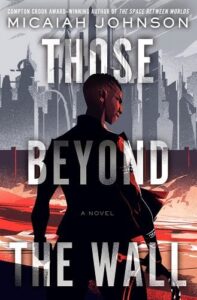Anyone who knows me, or has read my second book, or has stood too close to me at a bookstore knows I despise the concept of genre. I despise the tweed coat that genre wears when it decides what is literary and what is not. I despise the lab coat genre wears when it separates hard sci-fi from soft sci-fi. I despise genre’s internalized misogyny as it reliably separates anything feminine into whatever category is least likely to garner acclaim.
There is one thing, though, that I find genre invaluable for: communicating a contract with the reader.
Imagine a line with “Safety” at one end and “Threat” at the other. Genre determines where on this line your reader can expect to be left. Are you working in Happily Ever After romance? Then you are located closer to the “Safety” side of things. You’ve made certain promises to the reader that, no matter how perilous the waters, you will get them back to port. Psychological horror? Oh, you have promised misery. The reader is consensually entering into an antagonistic relationship with you and expects that to be honored with suffering. Of course, very few works exist only at the furthest points on this scale – there is usually some care in terror, and some peril in love – but generally if you’ve promised psychological horror and the reader never feels disquieted, you’ve not fulfilled your contract. The same is true if you’ve promised love, and instead made the reader feel disquieted the whole time.
This understanding is why I write every single story as a murder mystery author, even though I do not strictly write murder mysteries. The murder mystery author’s contract is neither kind nor cruel, but a kind of trickster middle. The murder mystery author gets to behave like an older sibling who is as bullying as they are loving: I will trick you, there will be death, but there will also be resolution. It is the antagonism of the horror writer, but in the form of a game. And, most importantly, it is a game the reader can win.
There are still standards for murder mysteries. Make the game impossible to figure out and the reader will feel spurned by an unearned ending. Make the game too easy, and risk getting the dreaded “I figured that out in the first chapter” from the obnoxiously annoying know-it-all former prodigy whose name rhymes with Papaya Yonson. But at its bones, murder mysteries operate with the mechanics of storytelling laid bare. The best pieces of writing advice I’ve ever received could be summed up as “Write like it’s a murder mystery even when it’s not”; “Your main character should know at least one thing you withhold from your audience, so their life feels believable rich” – the best part of a murder mystery is when a character’s secrets come out, as do the reasons to trust or distrust them. “B Plots should feel like side quests, not derailments, so the reader doesn’t feel you’ve wasted their time” – good mystery authors have to balance red herrings, so they feel like contributions to the story rather than unfair, unnecessary excess. And, of course, perhaps the best writing advice I’ve ever gotten: “The perfect endings are equal parts surprising and inevitable.” You can easily succeed at the former (“It was all a dream!” or “Surprise! Turns out the narrator was a cat all along!”). But that doesn’t make for a satisfying ending. Likewise, you can succeed at making things feel inevitable simply by being a boring and predictable writer. But to do both and get that “Wait but… oh, of course” reaction is always the goal. Even if we’re striving for this reaction through plot and character arcs generally, this is the standard in murder mysteries for revealing the culprit.
As a speculative fiction or science fiction or science fantasy author, (you’ll recall my position on genres), I am able to pull the rug out from readers even more thoroughly, as my readers do not know they are reading a mystery. They don’t initially know to be suspicious of me, or to look for clues, because they think they are reading a science fiction novel. Just like you thought you were reading a craft essay. But I told you: always keep one thing from your reader, always tell a little lie.
So now the truth, or a new version of it: The reason I write in the murder mystery format has nothing to do with craft. I am drawn toward murder mystery as my north star because I learned long ago that we all want to feel safe, but for some of us an imperfect safety is the only kind we can trust.
I am up to my absolute eyebrows in creative writing education, but I did not learn to identify with murder mysteries in a craft course or workshop. I learned to love murder mysteries listening to audiobooks in the car with my grandmother, riding shotgun if I was lucky, riding less-than-legally in the storage compartment in the back of the van if I was not (the burden and joy of being the youngest of my sisters and cousins). Long before the era of Libby, Audible, or Spotify’s new nefarious audiobook option, (Marry, Fuck, Kill, for anyone wondering), my murder mysteries came in cases of ten to twenty cassettes that interrupted the story every few hours to yell “INSERT TAPE TWELVE SIDE B.” The tapes held the magic of a liminal space, of safety without stagnation. We weren’t going to Disneyland; we were driving out into the middle of the desert so my grandma could make twenty-five to eighty dollars writing condition reports on empty properties for banks too cheap to hire appraisers. Ahead of us was usually the office where she worked, which meant either being bored or, because my family has always had a tenuous grasp of child labor laws, helping. Behind us was home, a place of uncertain chaos even when we didn’t have a gaggle of cousins, kids, aunts, dogs, goats, a pig, and – briefly one magical summer – two horses living with us. In the space between bored safety and anxious wildness, was the journey. Murder mysteries, with their dual promise of surprise and satisfaction, were the perfect backdrop.
With my second book coming out, I have lost some of my element of surprise. Readers already familiar with my trickster orientation are cracking their knuckles and stretching for the test, and in response I am compelled to up my game and the complexity of the uncertainties I’ll deploy at them.
But deep down they don’t want to win, and neither do I. I want to give readers the feeling of having someone they love gently guide them down the road with an endless stretch of blue sky softening the jagged landscape of Joshua Trees and scars from long dead rivers, laughing when the driver is too slow to turn down the volume at sex scenes or curse words, the excitement of the narrative and non-zero chance of seeing a coyote balanced out by the gentle lull of the tires under them and the certainty that they will safely arrive wherever they need to be. All of this, and this essay too, are just too many words for trust.
***


















